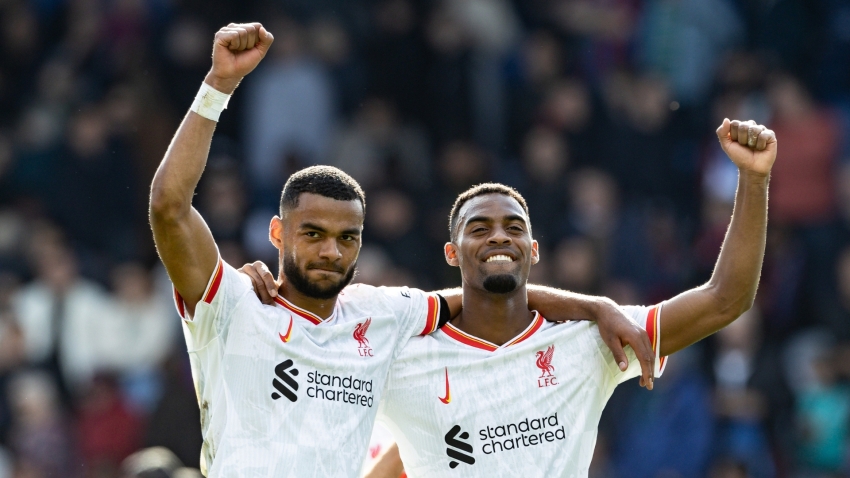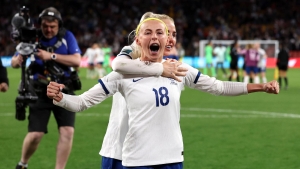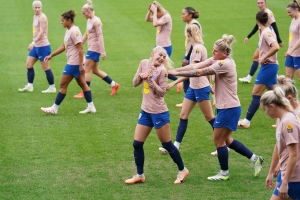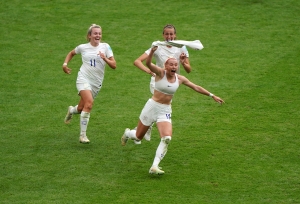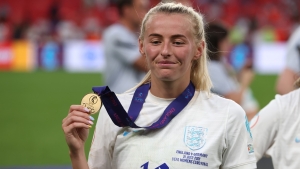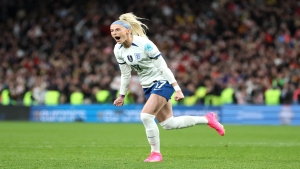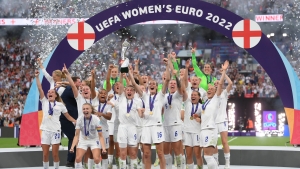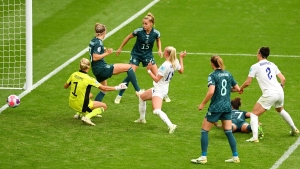England fans have been singing about football "coming home" since 1996, when the country hosted the men's European Championship.
Terry Venables' team were ultimately eliminated in the semi-finals at Wembley Stadium by Germany in heartbreaking fashion on penalties. Gareth Southgate, who until now had come close than any other manager to ending England's long wait for glory, missed the crucial spot-kick.
More than 26 years on, Sarina Wiegman's women's team had a chance to finally bring it "home", and it came against Germany, naturally.
This time, they had that extra gear to overcome a setback, and ended 66 years of hurt with a 2-1 success.
England's men reached the final of Euro 2020 last year, losing on penalties to Italy, but that day had been marred by crowd issues before the match at Wembley.
There was no sign of such issues on Sunday. The only clouds hanging over Wembley before this game were in the sky.
Wiegman has secured back-to-back European Championships, having also won with the Netherlands in 2017, and rubber-stamped the immense improvement she has brought to the Lionesses since replacing Phil Neville.
That this win came a day after Neville's Inter Miami had surrendered a 3-2 lead in the last 10 mins to draw 4-4 in a Major League Soccer match felt appropriate. England are a far superior machine to the one Neville led, and one with a better depth of quality, with both goals coming from substitutes.
Both teams were set to go in unchanged until Germany suffered a blow when captain Alexandra Popp sustained a muscle injury in the warm-up.
It was agonising for Popp, who went into the game as joint-top scorer in the tournament with six goals, but needed to net more than Beth Mead (also six) to take the Golden Boot due to the England star's superior assist record.
Popp's absence seemed to have an impact as Martina Voss-Tecklenburg's side struggled to threaten, though Mead did not have much impact on the game herself, rarely seeing any of the ball close to the German goal before coming off with a knock just after the hour.
Ellen White again started over Alessia Russo, despite the latter having scored twice as many (four to two) from the bench during the tournament, but White's work rate and harrying was on show in a first half of few chances.
Germany's best opportunity came courtesy of a chaotic goalmouth scramble in 25th minute that also resulted in a rejected VAR check for a penalty, while White blazed over from England's most dangerous attack.
Lina Magull dragged wide as Germany clicked into gear after the restart, and the biggest roar of the day by that point came when Ella Toone and Russo were introduced for Fran Kirby and White.
The greater cheer had been for Russo, whose four goals from the bench during the tournament was the most a player has scored at a single edition of a Women's Euros, but it was Toone who upped those decibel levels though as she ran onto a ball over the top from Keira Walsh before expertly lifting over Merle Frohms.
Toone became the first opposition player to score against Germany at the tournament, though DFB-Frauen almost hit straight back when Magull hit the woodwork.
Magull did have her goal with 11 minutes remaining though. Neat work on the right side saw the ball slid across by Tabea Wassmuth for the German number 20, who lifted her shot into the roof of the net to dampen England spirits and force extra-time in a Women's Euros final for the first time since 2001. On that occasion, Germany beat Sweden 1-0.
A familiar feeling for England. Extra-time... penalties... valiant defeat. But this team is different.
Chloe Kelly – who had replaced Mead – was the hero, prodding home at the second attempt after Germany failed to clear their lines. A brief wait to make sure the flag had not gone up was followed by uproarious celebrations. Football was through the gate, coming up the garden path...
Kelly's goal was England's 22nd of the tournament, a record by a team at any European Championship (men's and women's), and this time the hosts could see it out, the players either falling to their knees or running around the pitch as the magnitude of their achievement hit.
The first senior England team to win a major tournament since 1966, the first to ever win a European Championship, and the first to beat Germany in a Women's Euros final.
The 87,192 inside Wembley – a new attendance record for the Euros, men or women – immediately broke out into a rendition of Three Lions, informing those in any doubt that football was finally "home".
England have the trophy, but it is safe to say that during this historic tournament, women's football has most certainly been the winner. It came home for everyone.










